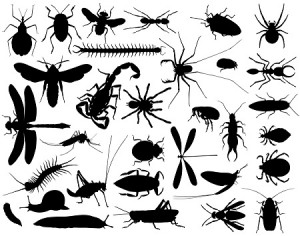
by David Klinghoffer
Evolution News and Views
On weekday mornings I wait with our 5-year-old twins at the bus stop for kindergarten where a couple of neighbor boys wait for the same bus. The other kids are older, the sons of a pastor and his wife who live a few houses down from us. One morning last week the younger neighbor boy pointed out a beautiful spider web that was hanging dramatically, suspended in the air between some bushes and a telephone pole.
He then reached down to get a stick and was about to knock the web down, when his older brother gently told him to stop. “God made spiders,” he explained.
I thought that was nice but it also opened up the question of why nature’s design — whether or not you think of God as the source of that design — includes some arthropods like spiders that many of us find less than cuddly, and what purpose there could be behind a variety of insects that are equally if not more bothersome. My own kids have asked questions along these lines — “Why do there have to be mosquitoes?” Whether in scientific or religious terms, I’ve lacked a compelling response. Until now, thanks to the National Science Foundation.
The NSF is busy plugging a study they funded, published in Science [1], that purportedly offers “hard evidence of evolution.” What they mean, of course, is hard evidence of microevolution, which no one doubted anyway. Still, the results are enlightening:
At first blush, many people would probably love to get rid of insects, such as pesky mosquitoes, ants and roaches. But a new study indicates that getting rid of insects could trigger some unwelcome ecological consequences, such as the rapid loss of desired traits in plants, including their good taste and high yields.
Specifically, the study — described in the Oct. 5, 2012 issue of Science and funded by the National Science Foundation — showed that evening primroses grown in insecticide-treated plots quickly lost, through evolution, defensive traits that helped protect them from plant-eating moths. The protective traits lost included the production of insect-deterring chemicals and later blooms that gave evening primroses temporal distance from plant-eating larvae that peak early in the growing season.
These results indicate that once the plants no longer needed their anti-insect defenses, they lost those defenses. What’s more, they did so quickly — in only three or four generations.
Anurag Agrawal, the leader of the study and a professor of ecology and evolutionary biology at Cornell University, explains, “We demonstrated that when you take moths out of the environment, certain varieties of evening primrose were particularly successful. These successful varieties have genes that produce less defenses against moths.”
In the absence of insects, the evening primroses apparently stopped investing energy in their anti-insect defenses, and so these defenses disappeared through natural selection.
So the “evolution” for which there is now “hard evidence” amounts merely to the loss of a function. Take away the insects, and evening primroses lose their ability to deter insects. This is something we also knew already: evolution observed experimentally may include the degrading of function. It does not include the building up of complex new functionality. The latter appears to require direction from a source of intelligent design.
Read the Full Article Here: http://www.evolutionnews.org/2012/10/why_there_have_065021.html [2]
